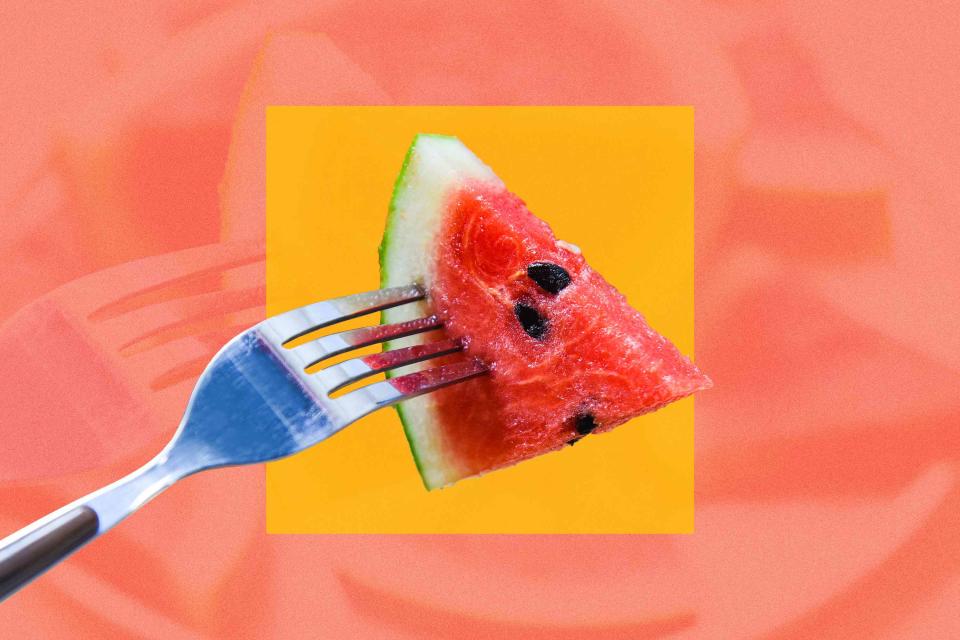Is Watermelon Good for You?
Learn more about the various health benefits of this tasty fruit.

Getty Images / Shape
Watermelons aren't the world’s largest fruits (that honor goes to the Atlantic giant pumpkin), but as far as everyday eating goes, it’s probably the biggest one you’re likely to place—or, more aptly, drop awkwardly—into your grocery cart.
Its big, unwieldy size is worth the effort, though. This fruit’s crisp, inimitable texture and natural sweetness make it a delightful seasonal treat. Plus, it’s an extremely versatile food, adding heft and flavor to salads, smoothies, popsicles, and more. No wonder it's such a popular choice! In fact, one survey found that 46% of consumers said they had purchased watermelon in the past year.
Still, watermelon is often dogged by beliefs that it contains too much sugar or too many carbs. Some people even avoid it due to concerns that it could cause weight gain or mess with blood sugar numbers. While it’s true that watermelon does have naturally occurring sugar, it’s still an extremely healthy food. Here’s what to know about this one-of-a-kind red fruit.
Nutritional Value of Watermelon
According to the USDA, 1 cup (152g) of watermelon is an excellent source of vitamin A and C. It also provides the following nutrients.
Calories: 46
Carbohydrates: 11.5g
Sugar: 9.4g
Protein: 0.9g
Fat: 0.2g
Vitamin C: 12.3mg
Vitamin A: 42.6mcg
Potassium: 170mg
Health Benefits of Watermelon
Watermelon comes packed with numerous nutrients that boost wellness. Below are just a few of its evidence-based benefits.
Helps with Hydration
It’s right there in the name—watermelon is full of water. To be exact, each serving contains 92% water, making it one of the most hydrating foods on the planet.
Crunching on a solo wedge or including watermelon in recipes is a great way to reach your daily water intake. And because the fruit naturally provides potassium and magnesium—which are electrolytes—it can help your cells absorb water even more efficiently.
Could Play a Role in Cancer Prevention
You may have heard of the antioxidant lycopene as a cancer-preventing superstar in tomatoes. Well, good news—tomatoes aren’t the only red fruit with high amounts of this compound. Watermelon is another significant source.
According to a 2022 systematic review, most studies in humans have confirmed the anti-cancer activity of lycopene. Specifically, prostate cancer seems to be positively affected. That doesn’t mean, of course, that a watermelon snack here or there makes cancer go away, but it’s an excellent food to include in any cancer-prevention diet.
May Boost Immunity
Lycopene is just one of several antioxidants in watermelon. Others include cucurbitacin E and vitamin C. So what’s the big deal about antioxidants? They play a major role in fighting off illness.
Some antioxidants—like vitamin C—help immune cells kick viruses and bacteria to the curb. Similarly, research has shown that lycopene can improve immune function by increasing natural killer cell activity.
Supports Heart Health
Watermelon is an American Heart Association (AHA) Heart-Check Certified food, meaning the AHA has given it a stamp of approval as a heart-healthy choice; and it’s not hard to see why.
Studies suggest that an amino acid called L-citrulline in watermelon could help support vascular health and maintain blood flow. The fact that watermelon has almost no fat (and zero saturated fat) also makes it heart-healthy.
Promotes Healthy Weight Maintenance
You can set aside worries that watermelon will make you put on pounds. Unless you eat your weight in the summer melon, it’s unlikely to cause weight gain. Because it’s 92% water, it’s quite a low-calorie choice at just 46 calories per cup.
And all that hydration can help fill you up, preventing cravings later on. In fact, a 2019 study gave one group of people 2 cups of watermelon and another group of people low-fat cookies with the same amount of calories. After eating the snacks daily for four weeks, those in the watermelon group reported less hunger and lower food intake overall.
Related: The Best Weight-Loss Apps to Help You Keep Track of Your Goals
Safety of Watermelon
Most people can safely eat watermelon without issue. But if you have issues with your blood sugar (such as type 1 or type 2 diabetes), you may need to be careful about how much of this fruit you eat. The sugars in watermelon could provide too many carbohydrates for your pancreas to keep up with. Talk to a healthcare provider such as a dietitian about whether you can include watermelon in your diet with these conditions.
People with irritable bowel syndrome (IBS) might also want to keep watermelon servings to a minimum. Because it’s high in FODMAPs (the short-chain carbohydrates that can lead to gas, bloating, and diarrhea), it could exacerbate symptoms. With a bit of experimentation, though, you can determine how watermelon affects you.
Nutritious Ways to Enjoy Watermelon
You can always eat watermelon by itself for a naturally sweet treat. But if you’d like to get a little more creative, try these possibilities.
Make an easy appetizer by topping cubed watermelon with feta cheese, shredded fresh basil, and a drizzle of balsamic reduction.
Blend frozen watermelon to make a one-ingredient slushie.
Add watermelon to a summery fruit salad with fresh berries.
Create a dessert “pizza” by topping watermelon wedges with a mixture of Greek yogurt and cream cheese, then sprinkling with toppings like berries or mini chocolate chips.
Whip up a refreshing fruit and veggie salad by combining watermelon chunks, cucumber slices, and fresh mint.
Is Watermelon Good For You?
Watermelon is high in antioxidants, vitamins, and (of course) water, and is low in fat and calories. Plus, it’s a whole, unprocessed food you can often get from a local source. This combination of components is a healthy mix for seasonal snacking and meal-making.
For more Shape news, make sure to sign up for our newsletter!
Read the original article on Shape.

